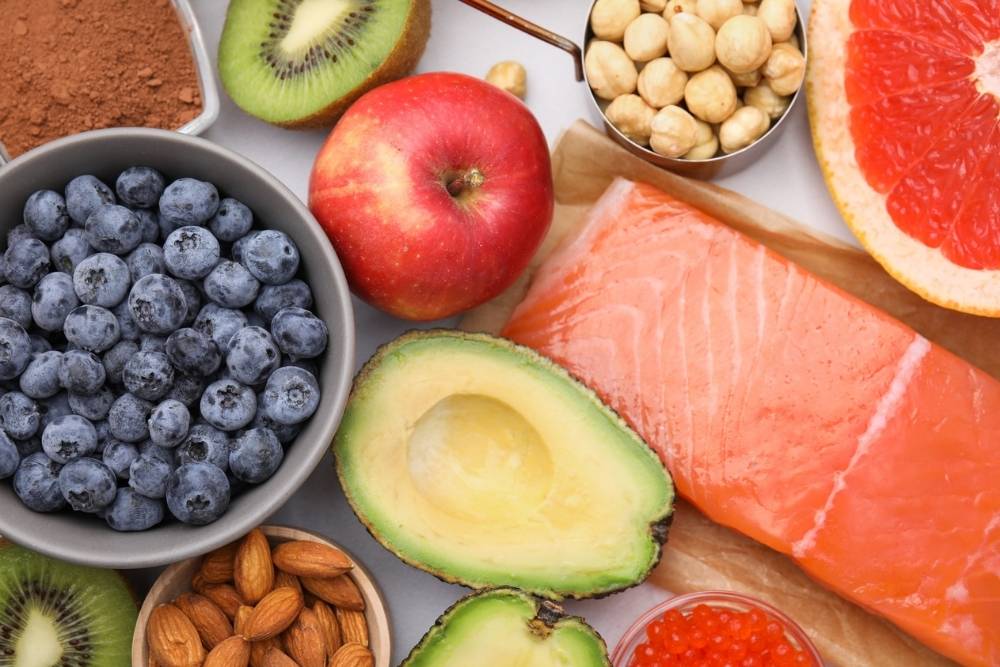Listen, we do not claim to be the first folks to ever offer up advice about healthy eating. If you are of a certain age, you might remember an animated character named Timer who appeared in a series of public service announcements about eating and related topics.
Now, Timer sang some memorable lines like, “I hanker for a hunk of cheese,” and “A peanut butter sandwich any time of day’s a treat,” and “Remember you’re the only you you’ve got.” We are not going to try to compete with the character’s animated pithiness or quibble about the advice he provided.
But we are going to offer up a series of blog posts centered on healthy eating and why it is important for a person in recovery from a substance use disorder. In this first entry, we will provide an overview of the kinds of foods that support your physical health, your mental health, and your ongoing recovery. We will follow that up with three entries, each focusing on a different meal (and some snacking choices, too). And we will wrap up the series with a look at two activities—cooking and gardening—that can help you eat more healthily more often.
Before we jump in, an important disclaimer: We are not nutritionists. If you are thinking about making significant changes to your diet, we recommend talking with your doctor.
When It Comes to Protein, Go Lean
Getting enough protein is important for a number of reasons. For example, lean proteins give the body energy and help with the production of key hormones. They also help repair damage to cells and tissues, strengthen the immune system, and support the creation and maintenance of lean muscle mass. As an additional bonus, lean proteins tend to make a person feel full more quickly, which generally leads to choosing healthier portion sizes.
Lean cuts of meat—including chicken, fish, turkey, and lean portions of beef and pork—are a good source of these proteins, but vegetarians and vegans have plenty of options for getting the protein they need. Those options include eggs, dairy products, beans, nuts, seeds, and soy.
When it Comes to Grains, Go Whole
Experts recommend that at least half of the grains you eat are whole rather than refined grains. That means being intentional in your grocery shopping to choose options other than white flour, white rice, and white pasta. Fortunately, you can find plentiful whole grain options on the grocery store shelves. Making the switch supports better overall health and your recovery.
When you are searching the grocery store shelves, look for brown rice, barley, oatmeal, quinoa, and whole grain options for breads, pasta, flour, and cereals.
When It Comes to Fruits, Veggies, and Leafy Greens, Go Colorful
Given how many fruits and vegetables can be eaten raw with little to no preparation, it is amazing how few of us eat enough of these foods.
Fruits, admittedly, tend to be more popular than vegetables, but it’s still worth emphasizing how healthful they are—and how easy they tend to be to eat. A quick wash or the removal of a peel is all it takes to get many fruits ready to eat. And because fruit tends to be sweet, they are a great replacement for any sugary snacks you have gotten into the habit of eating.
More people are convinced they simply do not like veggies. But there are so many options to choose from, and they can be prepared in so many delicious ways. You might have to engage in some trial and error, but we are confident you can find vegetables and preparations that you truly enjoy. We recommend enjoying fresh options rather than canned or frozen.
Leafy greens like kale, Bok choy, spinach, and dark green lettuces are also good options for supporting your health and your recovery.
When It Comes to Fats, Go Healthy
You may be skeptical that fats can be a healthy part of your diet. But healthy fats are essential to your well-being. They provide omega fatty acids—which promote tissue healing and repair—and brain function.
When it comes to fats, focus on finding the healthy options. Those can be found in fish, eggs, seeds, nuts, avocados, edamame, avocados, olives and olive oil, and—delightfully—dark chocolate.
When It Comes to Treatment, Go Wooded Glen
When you are struggling with alcohol or drugs, everything can feel hopeless. A substance use disorder undermines your life—your physical health, your mental health, your relationships, your finances, and more. And if you try to quit on your own, you will likely find yourself dealing with intense withdrawal symptoms—including strong cravings—that send you right back to the substances. It might feel like a trap from which you simply cannot escape.
But there is a way out. Effective treatment for a substance use disorder (as well as co-occurring mental health disorders) allows you to reclaim your life. At Wooded Glen Recovery Center—located in Henryville, Indiana—we provide personalized treatment grounded in evidence, experience, expertise, and empathy. We’re consistently recognized as one of the nation’s best substance use disorder treatment facilities, which means you can count on top-notch care from the moment you arrive at Wooded Glen.

